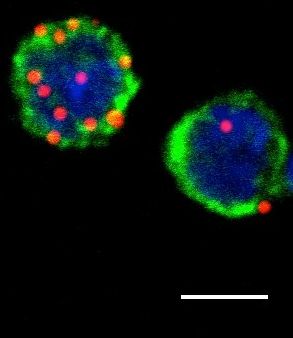Innate Lymphoid Cells Elicit T Cell Responses
Advertisement
In case of an inflammation the body releases substances that increase the immune defense. During chronic inflammation, this immune response gets out of control and can induce organ damage. A research group from the Department of Biomedicine at the University and the University Children’s Hospital of Basel now discovered that innate lymphoid cells become activated and induce specific T and B cell responses during inflammation. These lymphoid cells are thus an important target for the treatment of infection and chronic inflammation. The study was recently published in the scientific journal PNAS.

Innate lymphoid cells (ILC3s) with internalized antigens (red fluorescent dots).
University of Basel, Department of Biomedicine
Innate lymphoid cells (ILCs) are immune cells that regulate early immune responses against viruses, bacteria and parasites through the release of soluble factors. These cells can be classified into three subsets that each have various functions. Type 3 ILCs (ILC3s) are in addition essential for the development of lymphoid organs such as lymph nodes and for tissue repair.
ILC3s internalize antigen and induce T cell responses
The research group led by Prof. Daniela Finke found that ILC3s take up antigens and present these via so-called MHC molecules on their surface. Specific T cells then recognize these antigen-loaded MHC molecules and induce immune responses. The importance of this interaction between ILC3s and T cells for the immune defense was shown in mice that were lacking the MHC molecules on their ILC3s. These animals had severely reduced T and B cell immune responses.
Inflammatory signals activate ILC3s
So far, scientists assumed that ILC3s decreased T cell responses because they were lacking certain additional receptors required for efficient T cell stimulation. The research group of Prof. Finke was able to show for the first time that these important costimulatory receptors are produced by ILC3s when they are activated through inflammatory signals such as the soluble factor IL-1β. Moreover, ILC3s then produce factors that promote T cell responses.
The results of the Basel research team open up new ways for improving immune responses after vaccination and for preventing harmful immune responses for example during chronic inflammation.























































